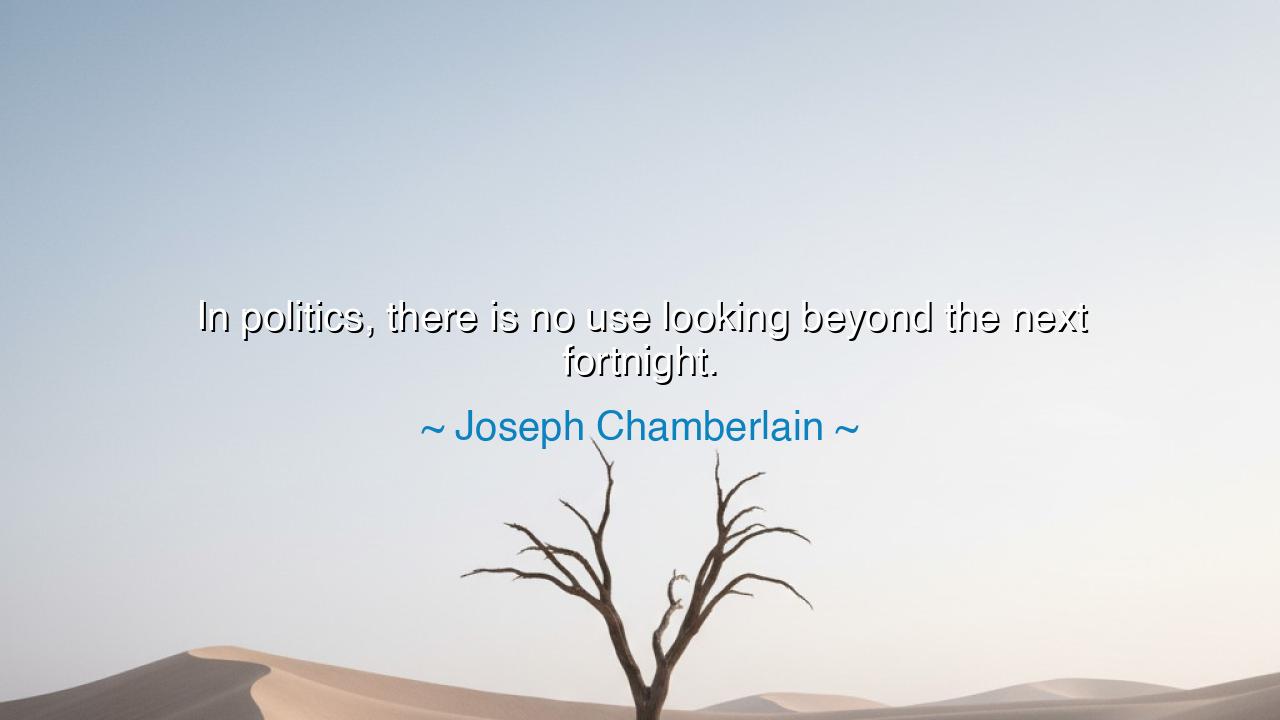
In politics, there is no use looking beyond the next fortnight.






Joseph Chamberlain’s words—"In politics, there is no use looking beyond the next fortnight"—speak with the sharp clarity of one who has seen the battlefield of power. They remind us that while the affairs of men may seem vast and eternal, the rhythms of politics often beat to the drum of the immediate, the urgent, the fleeting. Unlike philosophy, which gazes to the stars, or faith, which looks to eternity, politics is bound to the narrow horizon of days and weeks, where fortunes rise and fall like waves against the shore.
To say there is no use looking beyond the fortnight is not to deny the dream of the future, but to reveal the merciless reality of power. In the councils of state, alliances shift, enemies become friends, and promises dissolve like morning mist. The wise leader, therefore, does not cling too tightly to distant visions, for the present storm may never allow the voyage to reach them. Chamberlain, a man of British politics in the nineteenth century, spoke as one who had watched grand plans unravel because the world changed faster than the dreamers could adjust.
History offers us an image in Julius Caesar, who, though he longed for empire and eternity, was undone by the politics of weeks. On the Ides of March, a mere moment in the vastness of time, daggers ended his ambition. His downfall was not a failure of vision—Caesar saw centuries ahead—but of the fortnight, the failure to read the shifting tides of loyalty in the present. Thus, the quote warns: in politics, the short term devours the long term, and only those who master the present moment may hope to shape the future.
And yet, within this sobering truth lies a challenge to the leaders of tomorrow. To govern wisely is to balance the immediate with the eternal, to endure the turbulence of the fortnight while keeping an ember of vision alive. The mistake of many rulers has been to dream too far ahead while stumbling on the stones before their feet. Chamberlain’s wisdom teaches us that a leader must first survive today if he is ever to build tomorrow.
Let this be the lesson handed down: in the realm of politics, do not despise the small span of days, for within them lie revolutions, betrayals, and victories. The fortnight is both prison and possibility. He who triumphs in the moment may yet shape the ages—but he who ignores the moment is already lost.






DAdang duy anh
Chamberlain’s view reflects a certain realism about the political world. In an environment where public attention and priorities constantly shift, is it realistic for politicians to focus on anything beyond the immediate future? Or does this lead to policies that are reactive rather than proactive? Is there a way to create political systems that allow for both short-term action and long-term goals to coexist?
ALHa Anh Lee
It’s interesting that Chamberlain believes politics is so fleeting. Is it true that political decisions are often made with a very short-term view in mind, or does this reflect a more cynical take on the political process? Can we expect politicians to be visionaries when the public is only concerned with immediate issues? How much room is there for long-term thinking in such an environment?
TVDo Thi Tuong Vi
Chamberlain's perspective seems to suggest that political focus is often constrained by the immediate needs of the next few weeks. Does this hinder any real vision for the future? Could it be that the focus on short-term issues undermines long-term policy planning, or is it simply the nature of politics to work within these parameters? Could politicians do more to balance short-term action with long-term vision?
UNUYEN NGO
This quote raises an interesting point about the ever-present pressure of short-term politics. Does it mean that politicians are too focused on staying in power rather than making lasting change? How can political leaders prioritize the future when they are constantly concerned with the next election or immediate political conflicts? Can we ever break this cycle of short-term thinking in politics?
CDKim Chi Dam
Joseph Chamberlain’s quote seems to capture the short-term, reactive nature of politics. Is this the reality of modern-day political strategies? It makes me wonder if politicians are so focused on immediate gains and next steps that they fail to plan for long-term solutions. Does this approach hinder progress, or is it simply a matter of survival in an unpredictable political environment?